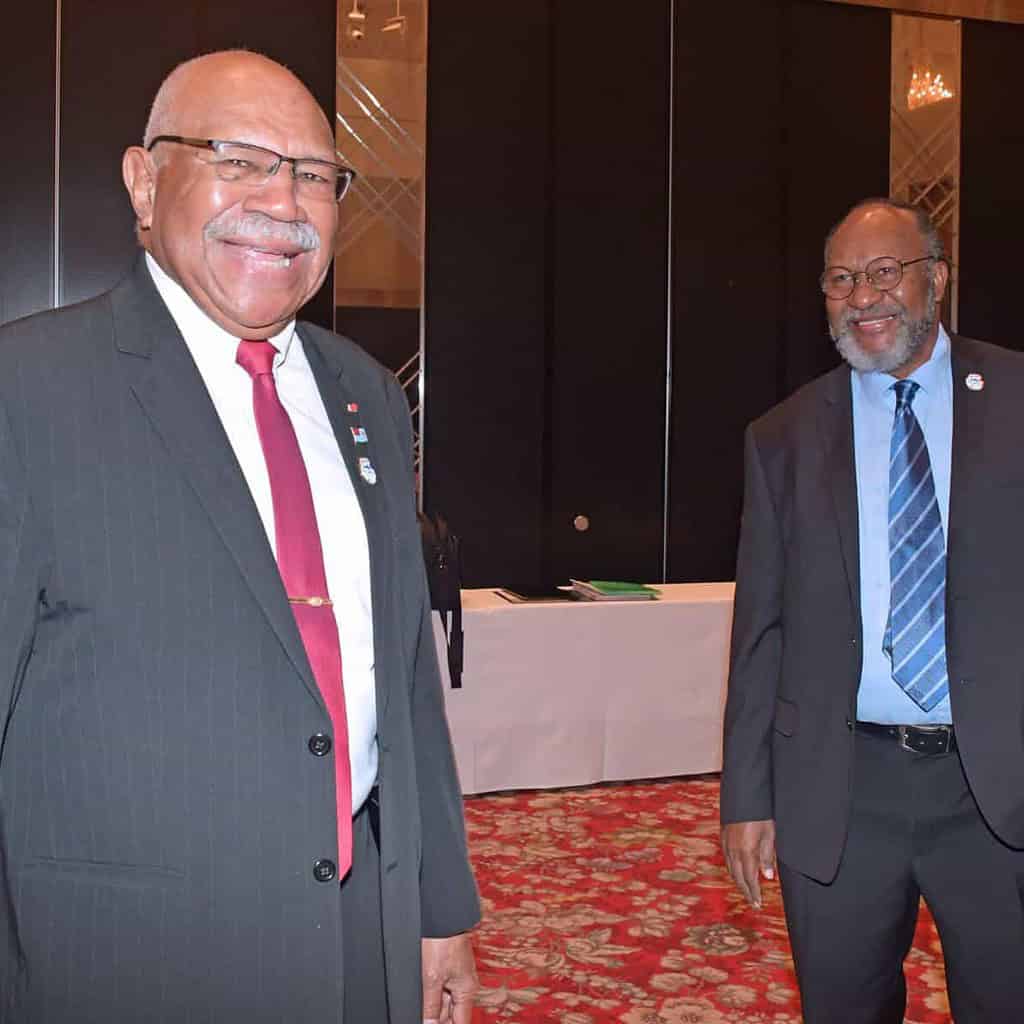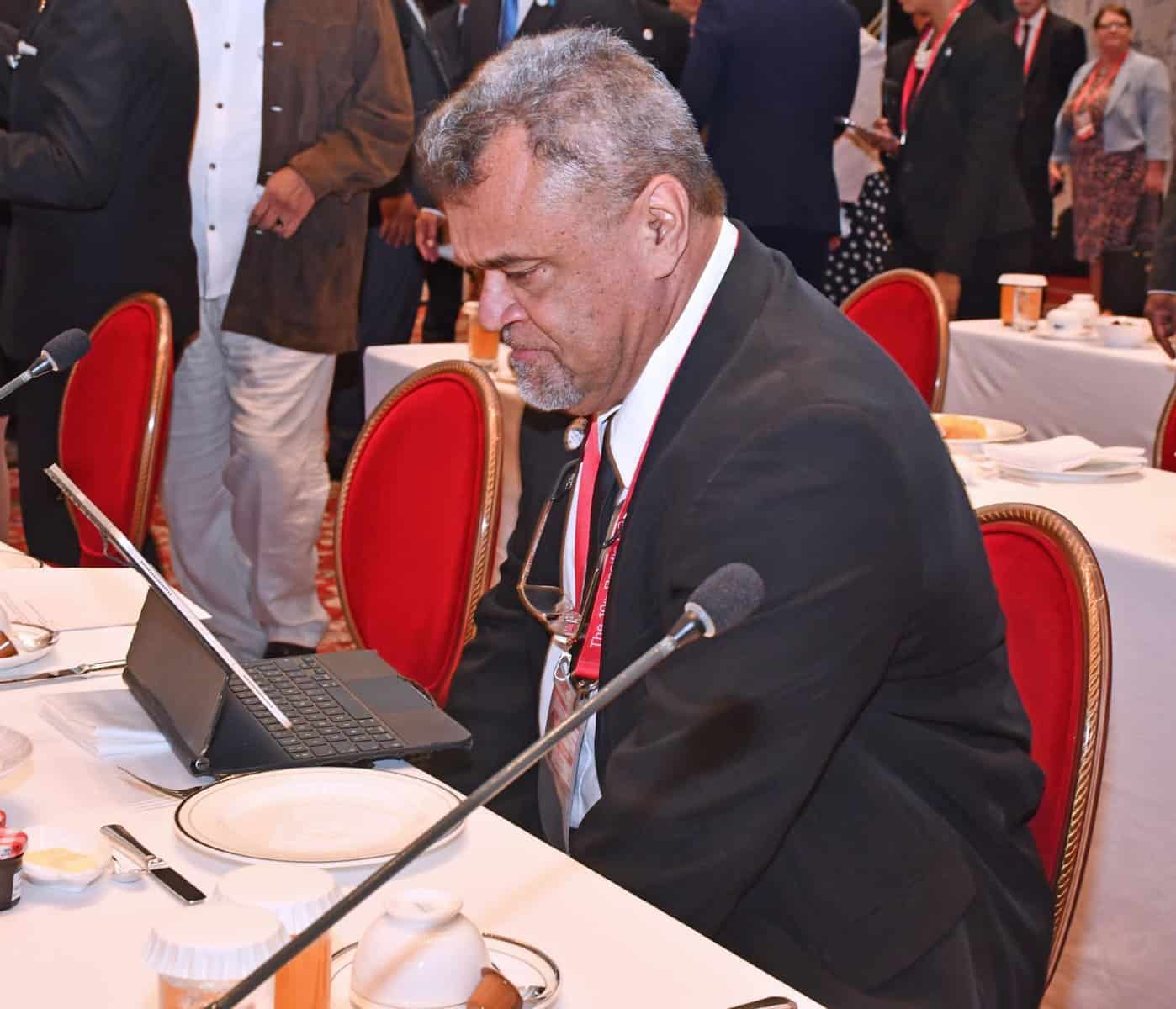As New Caledonia reels after two months of clashes between protesters and police, the Melanesian Spearhead Group (MSG) has called on France to allow independent monitoring missions to visit New Caledonia and assess current developments.
Meeting on the sidelines of the Pacific Area Leaders Meeting (PALM10) in Tokyo, the sub-regional organisation released a strong statement on 17 July in support of decolonisation for the French Pacific dependency.
The MSG statement affirmed that “we strongly believe that the lasting peace we are all seeking can only be guaranteed over time by efforts on both sides to propose political solutions that respond to the legitimate aspirations of the colonised indigenous people of Kanaky-New Caledonia, as part of the decolonisation process that has been underway since the Nouméa Accord.”
Following the deployment of more than 3700 police, riot squads and antiterrorist units – backed by armoured cars and French military forces – the MSG also criticised “the apparent militarisation of New Caledonia since 13 May 2024, which has the potential to undermine the peaceful resolution to the situation.”
The five-member MSG includes the governments of Papua New Guinea, Fiji, Vanuatu, Solomon Islands and the New Caledonian independence coalition Front de Libération Nationale Kanak et Socialiste (FLNKS).
The joint Tokyo Statement criticises the conduct of the December 2021 referendum on self-determination in New Caledonia – the third in a series under the Noumea Accord – describing the poll as “illegitimate and null and void.” As Islands Business reported at the time, most indigenous Kanak and other independence supporters refused to participate in the 2021 poll, with turnout halving compared to previous votes in 2018 and 2020.
Monitoring missions
Following more than two months of riots and clashes between protesters and police in New Caledonia since 13 May, regional organisations like the MSG and Pacific Islands Forum (PIF) have been pressing France to allow international monitoring missions to visit the islands. France’s Ambassador to the Pacific Véronique Roger-Lacan is in Tokyo this week, seeking to meet Pacific leaders to present the French government’s perspectives on the current crisis.
For many years, both the Forum and MSG have sent ministerial missions to monitor and observe key elections and referendums in New Caledonia. Today, both regional organisations are pressing Paris to allow observer missions to travel to Noumea before the next Forum Leaders Meeting, which will be held in the Kingdom of Tonga in the last week of August.
In recent years, Pacific diplomatic missions to New Caledonia have criticised the way the French State rushed through New Caledonia’s third referendum on self-determination under the Noumea Accord, held in December 2021.
To monitor the third referendum, the Forum deployed a ministerial mission led by former Fiji Foreign Minister Ratu Inoke Kubuabola, with Samoa’s former UN ambassador Feturi Elisaia and then Forum Secretary General Henry Puna. Their report, welcomed by Pacific leaders at the July 2022 Forum summit in Suva, criticised the credibility and legitimacy of the third referendum, after most independence supporters stayed away from the polls in the middle of the Covid pandemic.
At their Leaders’ Summit in August 2023, the MSG also criticised the conduct and credibility of the 2021 referendum, even though its results have been validated by the French courts.

The latest MSG Statement from Tokyo reaffirms these long-standing concerns, noting that “we are of the strong view that the conduct was not in accordance with the UN principles allowing a fair and unfettered process to be expressed by the indigenous peoples concerned, in particular, the obligation of the Administering Power to give ‘due respect for the culture of the peoples concerned’ during COVID-19, and therefore regard the conduct and the result as illegitimate and null and void.”
Rather than leave management of any future referendum solely to the French State, the MSG statement calls “for a new and fair self-determination referendum to be conducted with technical preparatory supervision by UN experts and observation missions for the actual independence referendum to determine the political future of New Caledonia.”
Charles Wea is a member of the New Caledonia delegation to the PALM meeting in Japan, and has represented the FLNKS at regional MSG meetings. For Wea, the MSG’s Tokyo Statement is an important contribution to raising awareness of the crisis on the international stage.
“While waiting for the formation of the new government in France, the FLNKS was asking for regional organisations like the PIF and the MSG to help New Caledonia find a political solution to the crisis” Wea told Islands Business. “So the statement adopted by the MSG was a good step towards the solution of the NC political crisis.”
“We don’t yet have any official reaction from the French government to this morning’s statement” he said, “but I think that France should accept such a mission, because it can contribute to finding a solution and help the transition towards New Caledonia’s sovereignty.”
UN decolonisation committee
At the United Nations, Fiji and Papua New Guinea are both members of the UN Special Committee on Decolonisation, which oversees the remaining 17 non-self-governing territories (including New Caledonia and French Polynesia, both under French administration).
For many decades, the French State resisted international scrutiny of its colonial policies and ignored international obligations created by UN decolonisation resolutions. At the height of armed conflict between the French armed forces and supporters of independence in the mid-1980s, a November 1986 internal memo from the French Ministry of Foreign Affairs stated: “We have never accepted resolutions 1514 (XV) and 1541 (XV), for which we abstained … We have never accepted the legitimacy of the Special Committee on Decolonisation, as directed by resolution 1564 (XVI), to propose the inscription of territories on the list of non-self-governing territories.”
In the face of this French opposition, the Pacific Islands Forum played a crucial role by supporting the re-inscription of New Caledonia on the UN list in late 1986. The passage of UN General Assembly resolution 41/41 in December 1986 opened the way for more international monitoring of New Caledonia. The UN Special Committee develops annual resolutions on New Caledonia for the UN Fourth Committee and General Assembly, and sent observer missions to monitor the referendums in 2018-21.
Since 2010, French ministers and diplomats have re-engaged with the UN Special Committee, seeking to blunt FLNKS diplomacy on the international stage. But after the completion of three referendums under the Noumea Accord, the French government and anti-independence parties from New Caledonia have called for the withdrawal of New Caledonia from the UN list.
This has been opposed by Melanesian nations – this week’s MSG statement from Tokyo “strongly reiterates our call to retain New Caledonia on the United Nations list of Non-Self-Governing Territories.” The MSG statement continues to call on France to meet its decolonisation obligations, urging the administering power “to continue to discharge its responsibilities in accordance with UNGA Resolution 1514 (XV).” The Melanesian nations bluntly declare “our opposition to any suggestions seeking to cease the responsibilities of the Administering Power over the Non-Self-Governing Territory of New Caledonia.”
In their Tokyo statement, the MSG governments also pledge further diplomatic assistance to New Caledonia’s independence movement. They will also investigate practical measures to assist the decolonisation process, such as scholarships to allow more Kanak students to attend universities and technical institutions across Melanesia.
Finding new interlocutors
For months, the FLNKS independence movement has been critical of the French State’s lack of neutrality during negotiations between supporters and opponents of independence on a future political status, as New Caledonians seek a new framework agreement to replace the 1998 Noumea Accord.
Angered by the botched December 2021 referendum and subsequent deadlines imposed by Paris for a political solution, leaders from the largest independence party Union Calédonienne have repeatedly criticised the French government’s lack of impartiality.
Trust has been badly damaged between key FLNKS leaders, French President Emmanuel Macron and ministers such as Overseas Minister Gérald Darmanin and Armed Forces Minister Sébastien Lecornu. Last March, FLNKS negotiator Roch Wamytan said: “I have already had the opportunity to tell [Darmanin]: his way of working is not the right one to move the discussions forward. The proof is that with him, things are blocked!”
Following President Macron’s dissolution of the French National Assembly and the subsequent elections on 30 June and 7 July, there is still uncertainty over who will lead the new government in Paris. Yesterday, Gérald Darmanin formally resigned his two government posts, as Overseas and Interior Minister. But while awaiting a new Prime Minister and Cabinet, the independence movement continues to seek new impartial interlocutors to break the current impasse over political status negotiations.
Earlier this year, the FLNKS issued a statement calling for “the establishment of a mediation mission led by a high-level dignitary, in order to guarantee the impartiality of the French State and to open a new phase of discussion.” They noted that “throughout history, the independence movement has had the opportunity to work with reliable and honest high-ranking French State interlocutors, despite our differences.”
This week in Tokyo, on the sidelines of the PALM Summit, MSG countries have again been pressing French representatives to allow a high-level, impartial delegation from France to visit New Caledonia, along with other missions involving the United Nations and Pacific representatives. The MSG statement calls on France “to continue to demonstrate good faith towards the Indigenous people of Kanaky New Caledonia and to elevate the negotiation to engage eminent persons from France at a higher level, particularly those who were involved in the negotiations that resulted in the conclusion of the Noumea Accord in 1998.”
The statement also calls on the French government “to allow an UN-MSG joint mission to visit New Caledonia, to assess the political and socio-economic status and propose ways for mutually and amicably addressing the situation in New Caledonia.”
After the eruption of conflict in mid-May, Fiji’s representative to the United Nations Ambassador Filipo Tarakinikini has been working to update the annual UN resolution on decolonisation for New Caledonia.
“Fiji and Papua New Guinea, as long-time members of the Decolonisation Committee, represent the Pacific community in advocating for the decolonisation process to be progressed,” Tarakinikini told Radio Australia.
“Part of the process is for us to send missions to check developments on the ground,” he said. “We are calling again for a UN mission to go and update itself about the realities on the ground. We are optimistic that, if the administering power on the ground sees fit, they will give the green light for an assessment mission to go ahead.”
Charles Wea told Islands Business that the French government has indicated it is willing to accept a mission to New Caledonia from the Pacific Islands Forum, “but it terms of timing they were proposing for September, after the annual meeting of the Forum in Tonga.”
In contrast, Pacific leaders hope to send their mission in August, in order to present findings to regional leaders at their annual summit in Tonga, hosted by Prime Minister Hu’akavemeiliku Siaosi Sovaleni between 26-30 August. Even as France awaits a new government in Paris, the crisis in New Caledonia remains high on the regional security agenda.
